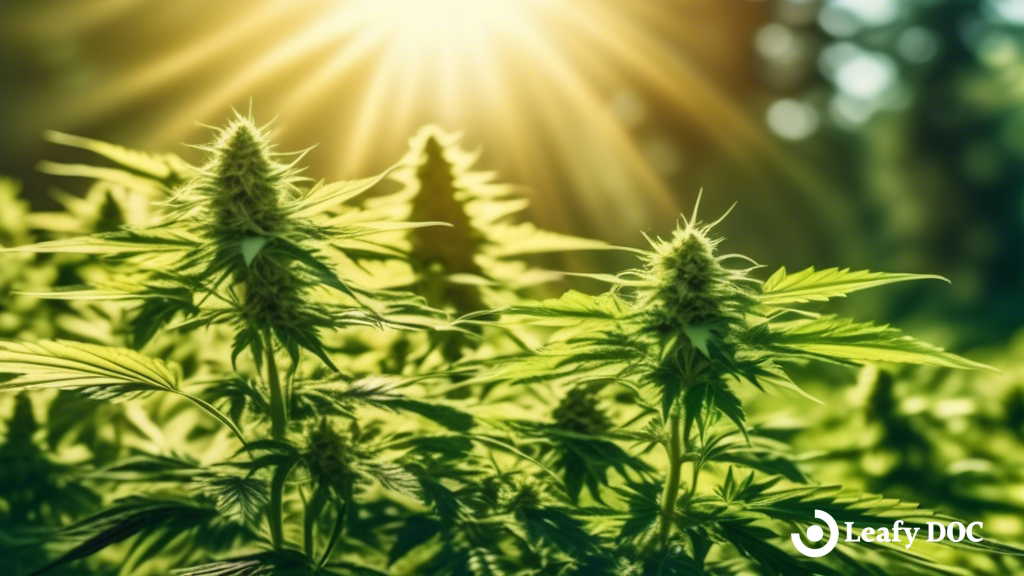Analyzing The Ongoing Debate On Cannabis Legalization
by Tayyaba Amir · April 1, 2024
Discover the intense debate surrounding cannabis legalization and join the discussion. Dive into the arguments, form your own opinion, and explore this hot topic now!

Are you ready to dive into the ongoing debate on cannabis legalization? Brace yourself for a journey through the complexities and nuances of this hot-button issue. Like a mesmerizing kaleidoscope of perspectives, the debate on cannabis legalization swirls and shifts, captivating the attention of individuals from all walks of life.
In this article, we will explore the history of cannabis prohibition, the health benefits of medical cannabis, the economic impact of legalization, the social and criminal justice implications, and the various perspectives surrounding this controversial topic.
Step into the time machine as we embark on a journey through history, unearthing the roots of cannabis prohibition. From the ancient civilizations that revered the plant for its medicinal properties to its eventual demonization during the early 20th century, the history of cannabis prohibition is a tapestry woven with both fact and fiction.
Along the way, we will uncover the powerful healing potential of medical cannabis, casting aside the stigmas and misconceptions that have clouded its reputation. Prepare to be amazed by the myriad of health benefits that this plant has to offer, as we delve into the scientific research and personal anecdotes that testify to its therapeutic properties.
As we navigate the intricate maze of cannabis legalization, we will also shed light on the economic impact it has on society. Like a catalyst for change, the legalization of cannabis has the potential to create a booming industry, generating jobs and revenue. But what about the social and criminal justice implications? Are we witnessing the birth of a more just and equitable system, or are we merely trading one set of problems for another?
Buckle up, dear reader, for this journey promises to be a rollercoaster ride of perspectives, ideologies, and thought-provoking debates. Get ready to explore the ongoing debate on cannabis legalization from a multitude of angles, as we strive to unravel the truths that lie beneath the surface.
Key Takeaways
- Cannabis prohibition has historically been motivated by concerns over public health and safety, as well as racial and cultural biases.
- The criminalization of cannabis has had disproportionate effects on marginalized communities, stigmatizing and demonizing users.
- Cannabis legalization has the potential to create job opportunities and generate tax revenue for communities, while also addressing the inequalities and injustices perpetuated through criminalization.
- The debate on cannabis legalization is fueled by arguments for its medicinal benefits, economic benefits, harm reduction, social equity, and reducing the burden on law enforcement. However, concerns about potential negative health effects, addiction, impaired cognitive function, and an increase in drug-related crimes are also raised.
The History of Cannabis Prohibition
You may find it surprising that the history of cannabis prohibition dates back to the early 20th century, when the Marihuana Tax Act of 1937 effectively criminalized the plant in the United States. This act imposed strict regulations and taxes on the production, sale, and use of cannabis, effectively pushing it underground and into the hands of criminal organizations.
The motivations behind this prohibition were varied, ranging from concerns over public health and safety to racial and cultural biases against certain communities that were associated with cannabis use.
Despite the initial intentions of the Marihuana Tax Act, the criminalization of cannabis has had far-reaching consequences that continue to impact society today. The prohibition has led to the stigmatization and demonization of cannabis users, resulting in countless individuals being arrested, incarcerated, and labeled as criminals for a plant that is increasingly being recognized for its therapeutic properties. This unjust criminalization has disproportionately affected marginalized communities, perpetuating systemic inequalities and further marginalizing those who are already vulnerable.
In understanding the history of cannabis prohibition, it becomes clear that the current debate on cannabis legalization is not just about the recreational use of a plant, but about rectifying the injustices and harm caused by decades of prohibition. It is about recognizing the potential benefits of cannabis for medical purposes, and creating a system that allows for responsible and regulated use.
The Health Benefits of Medical Cannabis
Examining the myriad of health benefits that medical cannabis offers, it’s intriguing to discover its potential in treating various medical conditions. Medical cannabis has been shown to provide relief for chronic pain, reduce nausea and vomiting associated with chemotherapy, and improve symptoms of multiple sclerosis. Not only that, but it has also been found to alleviate symptoms of epilepsy, reduce anxiety and depression, and even slow the progression of Alzheimer’s disease. The table below highlights some of the key health benefits of medical cannabis:
| Medical Condition | Potential Benefits |
|---|---|
| Chronic pain | Pain relief |
| Nausea and vomiting | Antiemetic effects |
| Multiple sclerosis | Symptom improvement |
| Epilepsy | Seizure reduction |
| Anxiety and depression | Mood enhancement |
| Alzheimer’s disease | Disease progression |
These potential benefits make medical cannabis a promising option for individuals seeking alternative treatments for their medical conditions. By providing relief from symptoms and improving overall well-being, medical cannabis has the potential to greatly improve the quality of life for those in need. It’s important to continue researching and exploring the potential of medical cannabis to ensure that it can be utilized effectively and safely for the benefit of all.
The Economic Impact of Cannabis Legalization
By legalizing cannabis, new businesses have been able to open up, creating job opportunities for individuals in need of work. From cultivation and production to distribution and retail, the cannabis industry has created a wide range of employment opportunities. Not only does this provide individuals with a means to support themselves and their families, but it also stimulates the local economy.
In addition to job creation, cannabis legalization has also led to increased tax revenue for communities. With the regulation and taxation of cannabis sales, states and municipalities are able to generate substantial amounts of revenue. This additional funding can then be used to invest in public services and infrastructure, improving the quality of life for residents. From funding education and healthcare to improving transportation and public safety, the economic benefits of cannabis legalization extend far beyond the cannabis industry itself.
The economic impact of cannabis legalization cannot be underestimated. It has not only created job opportunities for individuals but has also generated much-needed tax revenue for communities. By supporting the legalization of cannabis, you’re indirectly serving others by contributing to job creation and the improvement of public services.
The Social and Criminal Justice Implications
Consider the staggering social and systemic consequences of criminalizing cannabis. The criminalization of cannabis has had far-reaching effects on individuals and communities, particularly in marginalized and minority communities. Here are a few key points to consider:
- Disproportionate impact: Cannabis laws have disproportionately affected communities of color, leading to higher rates of arrests, convictions, and incarceration. This has perpetuated cycles of poverty and limited opportunities for individuals within these communities.
- Wasted resources: The criminalization of cannabis has resulted in the allocation of significant resources toward enforcing and prosecuting cannabis-related offenses. These resources could be better utilized in addressing more pressing social issues such as education, healthcare, and poverty alleviation.
- Loss of potential tax revenue: By criminalizing cannabis, governments miss out on potential tax revenue that could be generated through its legalization and regulation. This revenue could be used to fund public services and programs that benefit society as a whole.
- Ineffective deterrence: Despite the criminalization of cannabis, its use has remained prevalent. This suggests that criminalization is an ineffective deterrent and instead leads to an underground market that is unregulated and potentially dangerous.
- Criminal record implications: A criminal record for a cannabis-related offense can have long-lasting negative consequences for individuals, including limited job prospects, restricted access to housing, and barriers to education. This perpetuates a cycle of disadvantage and further contributes to social inequalities.
As you consider the social and criminal justice implications of cannabis legalization, it’s important to recognize the potential for positive change. By shifting away from criminalization and toward regulation, we can begin to address the systemic inequalities and injustices that have been perpetuated through the criminalization of cannabis.
Legalization allows for the implementation of policies that prioritize harm reduction, social equity, and community development. This approach not only serves the individuals who have been disproportionately affected by cannabis laws, but also benefits society as a whole by redirecting resources toward more pressing social issues and creating opportunities for economic growth.
The Perspectives on Cannabis Legalization
Imagine a world where marijuana is legal and the perspectives on its legalization vary greatly. On one hand, there are those who believe that cannabis should be fully legalized and regulated, arguing that it has numerous potential benefits for both individuals and society as a whole. They point to the medicinal properties of cannabis, which can provide relief for various health conditions such as chronic pain, epilepsy, and anxiety. They also highlight the economic benefits of legalization, including job creation and tax revenue generation. Additionally, proponents argue that legalizing marijuana can help reduce the burden on law enforcement and the criminal justice system, allowing resources to be allocated towards more serious crimes.
On the other hand, there are those who oppose the legalization of cannabis, expressing concerns about its potential negative effects on individuals and society. They argue that marijuana can be a gateway drug, leading to the use of more dangerous substances. They also raise concerns about the potential for increased addiction rates and impaired cognitive function, particularly among young people. Additionally, opponents of legalization worry about the potential for increased use of marijuana in public spaces, which could have negative social and health implications.
To further understand the differing perspectives on cannabis legalization, let’s take a look at the table below:
| Perspective | Arguments for Legalization | Arguments against Legalization |
|---|---|---|
| Health | – Medicinal benefits for various health conditions | – Potential negative health effects, such as addiction and impaired cognitive function |
| Economy | – Job creation and tax revenue generation | – Concerns about the commercialization and marketing of marijuana |
| Criminal Justice | – Reduces burden on law enforcement and the criminal justice system | – Potential increase in drug-related crimes |
Frequently Asked Questions
What are the different strains of cannabis and their effects?
Looking to learn about the diverse strains of cannabis and how they affect you? From the calming effects of the Indica strain to the energizing vibes of Sativa, explore the enchanting world of cannabis.
How does cannabis consumption affect mental health?
Cannabis consumption can affect mental health differently for each individual. While some find it helps with anxiety or depression, others may experience increased anxiety, paranoia, or even psychosis. It’s important to consider personal tolerance and potential risks before use.
What are the potential risks and side effects of using medical cannabis?
Using medical cannabis may have potential risks and side effects. These may include dizziness, drowsiness, impaired coordination, and increased heart rate. It’s important to consult with a healthcare professional before using medical cannabis.
How much revenue can be generated from the cannabis industry?
You might be surprised to learn that the cannabis industry has the potential to generate significant revenue. With the legalization of cannabis, states have seen an increase in tax revenue, job creation, and economic growth.
What are the potential consequences for individuals convicted of cannabis-related offenses prior to legalization?
If you were convicted of a cannabis-related offense prior to legalization, the potential consequences vary. Some jurisdictions offer expungement or reduced sentences, while others may still enforce penalties. Seek legal advice to understand your rights and options.
Last Updated: August 8, 2024
Get Approved for Your Medical Marijuana Card in Minutes!

Get Your Medical Card
Connect with a licensed physician online in minutes

Like This Article?
Share with your friends
Table of Contents
Keep Reading
-
Does Weed Make You Lose Weight?
We all know someone who seems to be able to eat whatever they want and not gain a pound. But could their secret be marijuana?
-
5 Steps to Connect with Medical Marijuanas Doctors in Arkansas
Connect with licensed medical marijuanas doctors in Arkansas for efficient, compassionate care.
-
5 Steps to Find a Qualified Medical Cannabinoids Doctor
Discover how to find a qualified medical cannabinoids doctor for effective cannabis treatment.



